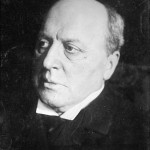
by Katie Davis
Henry James was not a one-hit-wonder novelist. Throughout his lifetime he wrote more than 22 novels, in addition to over 100 short stories, and many essays and plays. Though not all of his works became classics, he produced such gems as The Turn of the Screw, Daisy Miller, The Portrait of a Lady, The Wings of the Dove, and The Ambassadors, the piece James considered his “most perfect work of art.”
James’ accomplishments alone suggest a passion for the novel as a literary form, but in his essay “The Art of Fiction,” James makes his feelings explicit. As most people during the late 19th Century did not consider novels to be serious, meaningful works, James strived to convince them that the novel should be viewed as “one of the fine arts” rather than a work of mere “make-believe.” Fortunately for us, James sprinkled the essay with advice on how to craft the perfect novel. So, for all you (budding) novelists out there, listen up! Henry James has something to say:
“The only reason for the existence of a novel is that it does compete with life.”
As a true proponent of literary realism, James believed a novel should strive to portray events as authentically as possible in order to capture the texture of the human experience. To accomplish this he advocated strict attention to detail and the use of thorough description. Without an “air of reality,” James believed there was no point in writing a novel at all.
“A novel is in its broadest definition a personal impression of life.”
For James, the real did not signify the objective. He believed the novel was indeed a reflection of the author’s personal experience in the world and that a work would possess more “truth of detail” if it came out of the writer’s individual impressions. Therefore, James prescribed to the well-worn mantra “Write what you know!”
“The only obligation to which in advance we may hold a novel without incurring the accusation of being arbitrary, is that it be interesting.”
Though Henry James believed the novel to be a literary art form, he did not ignore its primary function: to entertain. So if you are stuck in a writer’s rut, don’t be afraid to have a little fun. After all, James believed that novelists should enjoy the creative freedom of writing and he urged us to “take possession of it, explore it to its utmost extent, reveal it, rejoice in it.”
Happy Birthday to Henry James b. April 15, 1843
